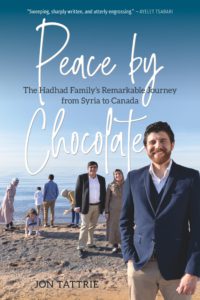The cryptic email — from a name Jon Tattrie didn’t recognize — landed in his inbox in the summer of 2020. The sender said they were a friend of Charles R. Saunders, one of Tattrie’s editing colleagues from the defunct Halifax Daily News. They’d been trying, without success, to contact their friend. Would Tattrie check to make sure Saunders was OK?
He wasn’t. Saunders had died, alone, during the first COVID lockdown and been buried in an unmarked grave outside Dartmouth, NS.

Jon Tattrie (Photo by Giselle Melanson-Tattrie)
Tattrie, who’d known Saunders as a “great journalist and important nonfiction author,” recalled that Saunders had gifted him a copy of Imaro, Saunders’ first novel, to mark the publication of Tattrie’s own fictional debut.
But as he began piecing together Saunders’ obituary for the CBC, “I was stunned to learn that my old colleague hadn’t just written a novel. He’d founded a powerful and important genre of writing.”
Saunders took what American author Robert E. Howard did with Conan the Barbarian and a mythical European history in his synthesis of historical adventure, fantasy and horror known as “sword and sorcery,” and reimagined it with Imaro, a larger-than-life Black superhero in an African setting, creating a subgenre Charles named “sword and soul.”
That revelation was the beginning of a journey that led Tattrie not only to launch an international fund-raising campaign to construct a headstone to memorialize Saunders but also Tattrie’s own latest book project, Sword and Soul: How an American Exile Rewrote Fantasy.
Sword and Soul will be Tattrie’s ninth book, his second since graduating with his Master of Fine Arts in Creative Nonfiction degree from the University of King’s College in 2020.
His ninth book? Why would Tattrie, already a well-known Nova Scotia journalist and the author of so many books, enrol in a program to help him write a book?
“I enrolled thinking the academic qualification could be useful career-wise,” he admits. But he quickly discovered the program offered much more.
“I used to write on instinct, and fast, as if the book would vanish if I didn’t write it down quickly.”
Working with the program’s mentors — Harry Thurston, Ayelet Tsabari and Wanda Taylor — “the MFA helped me break down my entire writing process and rebuild it.
“Even when you’re a published writer,” he adds, “it can be hard to get good, in-depth criticism to improve your work. My three mentors have joined the permanent collection of writing advisors I keep in my head. Even two years after graduating, I can hear their voices as I write, guiding me to stronger storytelling.”
After trying and failing to land an agent on his own “many times,” Tattrie signed with the CookeMcDermid Agency after meeting one of their agents during a pitching exercise at an MFA winter residency. “It’s difficult to even know who the right agents and editors are, let alone get a one-on-one meeting with them. Sitting down with an agent for 15 minutes made a huge difference in opening the door and letting me stick my foot in it while I made the case for Peace by Chocolate. I think giving the agent a box of chocolates may have also helped,” he jokes.

Peace by Chocolate by Jon Tattrie
Peace by Chocolate, his MFA book project, tells the story of the Hadhads, a Syrian refugee family who rebuilt their lives in Canada after the devastation of the Syrian civil war. Published in 2020 by Goose Lane Editions, it was shortlisted for the Dartmouth Book Award for Nonfiction and the Taste Canada Awards in the Culinary Narratives category, as well as being listed as a Hill Times Top 100 selection for 2020.
Tattrie says response to the book has been “amazing! The Hadhads are such a lovely family, and their story is so powerful. I always wanted them to feel that it was their book, and for people to read it as their book.”
In fact, Tareq Hadhad, the CEO of the family company, Peace by Chocolate, is on this year’s CBC Canada Reads panel, championing What Strange Paradise by Omar El Akkad, another book about the refugee experience.
“For me,” says Tattrie, “that’s even better than having my book on Canada Reads.”
Tattrie is now “neck-deep” in his biography of Saunders.
It too is a fascinating story.
In the early 1980s when Saunders began writing his African-inspired super-heroes — about Imaro, for example, and Dossouye, a West African woman warrior based on the real history of female warriors in the Kingdom of Dahomey — publishers and producers insisted on “whitewashing” his stories by turning Saunders “all-Black African adventure into an all-white European farce,” or insisting on book covers that transformed his Black hero in a ”heavily tanned Tarzan type.”
Because Saunders rejected those efforts to subvert his work, Tattrie says, he “worked in obscurity for decades” but produced “masterpieces I think will go down as some of the greatest literature ever written in Canada.”
Sword and Soul: How an American Exile Rewrote Fantasy will be published in 2024 by McClelland & Stewart.

